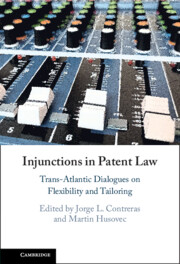Injunctions in Patent Law
Patents are important tools for innovation policy. They incentivize the creation and dissemination of new technical solutions and help to disclose their working to the public in exchange for limited exclusivity. Injunctions are important tools of their enforcement. Much has been written about different aspects of the patent system, but the issue of injunctions is largely neglected in the comparative legal literature. This book explains how the drafting, tailoring and enforcement of injunctions in patent law works in several leading jurisdictions: Europe, the United States, Canada, and Israel. The chapters provide in-depth explanation of how and why national judges provide for or reject flexibility and tailoring of injunctive relief. With its transatlantic and intra- European comparisons, as well as a policy and theoretical synthesis, this is the most comprehensive overview available for practicing attorneys and scholars in patent law. This book is also available as Open Access on Cambridge Core.
Jorge L. Contreras is Presidential Scholar and Professor at the University of Utah S.J. Quinney College of Law.
Martin Husovec is Assistant Professor at the London School of Economics and Political Science, LSE Law School.



